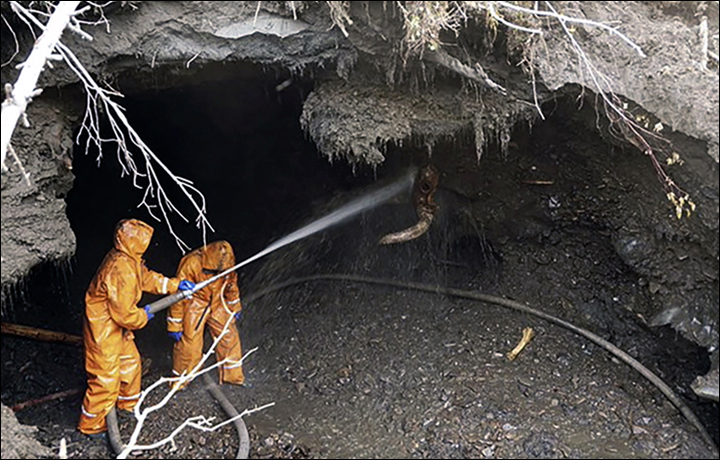Call to protect unique site with thousands of ideally preserved bones of prehistoric animals.

Bone hunters inside a man-made permafrost cave of the Yunyugen mammoth graveyard site. Picture: Sergey Leshchinsky
Yunyugen mammoth graveyard in the northe of Yakutia is paleontological world treasure site with multiple remains of mammoths, woolly rhinos, Pleistocene era bisons and deers kept in perfect condition in permafrost.
This is where these prehistoric animals – many now extinct – came to die.
The unique site on the Yana River above the Polar circle was discovered at the turn of the 20th century by Arctic explorer Baron Eduard von Toll.

Some skulls are so well-preserved they still have skin on them, while ancient antlers display outer velvet covering.
‘This level of preservation is unheard of in most of Eurasia, and this is what became the site’s curse because dozens of bone hunting brigades flock here every summer with their pumps. Most of the skulls are completely preserved with tendons and cartilage intact’, said palaeontologist Sergey Leshchinsky.
The jet pumps obliterate the permafrost and explode the relics.

Professor Leshchinsky from Tomsk State University has worked at Yunyugen mammoth graveyard with colleagues from St Petersburg and Yakutia – and dozens of bone hunters.
Mammoth tusks no less than woolly rhino horn are liquid commodities in Russia and abroad, with one find selling between half and five million roubles.
The price depends on weight and level of preservation.
Such demand has created a mammoth bone rush in Yakutia, with prospective millionaires making their way to Yunyugen, with scientists often facing an ugly scramble with hunters for finds.
Seven years ago the area around the Yunyugen stream was all covered with wood.
Now for about two kilometres to each side of the stream there are endless man made caves washed by the destructive pumps of bone hunters.
Abandoned skulls of mammoths, rhinos and bisons lie scattered in piles around each of the caves.

‘The hunters use fire extinguishing hoses to suck water from Yunyugen stream and direct it at the walls of the permafrost hills. Bone washing goes on all summer long’, Professor Leshchinsky said.
‘The business demands colossal investment as one pump takes up to 300 litres of diesel a day.
‘Hunters wash away permafrost and pick only what they see as valuable, which is mammoth tusks and whole rhino tusks’, he explained.
Hundreds of bones which could be easily assembled into complete skeletons are left unattended, as it is too expensive to transport them.
Thousands of prehistoric remains get destroyed at Yunyugen every summer, and the chaos continues as the site is not protected by the state.
This summer participants of the scientific expedition decided it was time to call on the world science to rescue the site.
‘We must declare Yunyugen a geological site, a monument protected by the state in order to preserve and comprehensively study it. This unique location of the mammoth fauna must belong to humanity’, the palaeontologist said.
Now scientists from Tomsk State University, North-Western Medical University from St Petersburg and North-Eastern Federal University in Yakutia plan to appeal to government of Yakutia also known as the Sakha Republic, the largest region in the Russian Federation.
The appeal will include signatures of leading geologists and palaeontologists.